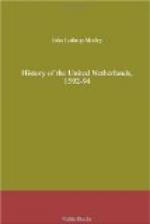The first soldier and most unscrupulous diplomatist of his age, he died when scarcely past his prime, a wearied; broken-hearted old man. His triumphs, military and civil, have been recorded in these pages, and his character has been elaborately pourtrayed. Were it possible to conceive of an Italian or Spaniard of illustrious birth in the sixteenth century, educated in the school of Machiavelli, at the feet of Philip, as anything but the supple slave of a master and the blind instrument of a Church, one might for a moment regret that so many gifts of genius and valour had been thrown away or at least lost to mankind. Could the light of truth ever pierce the atmosphere in which such men have their being; could the sad music of humanity ever penetrate to their ears; could visions of a world—on this earth or beyond it—not exclusively the property of kings and high-priests be revealed to them, one might lament that one so eminent among the sons of women had not been a great man. But it is a weakness to hanker for any possible connection between truth and Italian or Spanish statecraft of that day. The truth was not in it nor in him, and high above his heroic achievements, his fortitude, his sagacity, his chivalrous self-sacrifice, shines forth the baleful light of his perpetual falsehood.
[I pass over, as beneath the level of history, a great variety of censorious and probably calumnious reports as to the private character of Farnese, with which the secret archives of the times are filled. Especially Champagny, the man by whom the duke was most hated and feared, made himself busy in compiling the slanderous chronicle in which the enemies of Farnese, both in Spain and the Netherlands, took so much delight. According to the secret history thus prepared for the enlightenment of the king and his ministers, the whole administration of the Netherlands—especially the financial department, with the distribution of offices—was in the hands of two favourites, a beardless secretary named Cosmo e Massi, and a lady of easy virtue called Franceline, who seems to have had a numerous host of relatives and friends to provide for at the public expense. Towards the latter end of the duke’s life, it was even said that the seal of the finance department was in the hands of his valet-de-chambre, who, in his master’s frequent absences, was in the habit of issuing drafts upon the receiver-general. As the valet- dechambre was described as an idiot who did not know how to read, it may be believed that the finances fell into confusion. Certainly, if such statements were to be accepted, it would be natural enough that for every million dollars expended by the king in the provinces, not more than one hundred thousand were laid out for the public service; and this is the estimate made by Champagny, who, as a distinguished financier and once chief of the treasury in the provinces, might certainly be thought to know something of the subject. But Champagny was beside himself with rage, hatred.]




